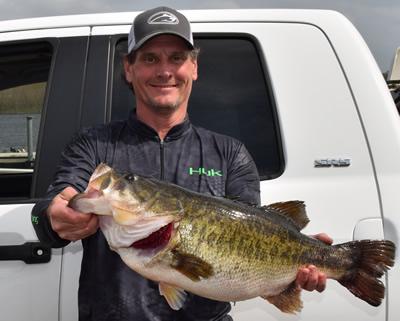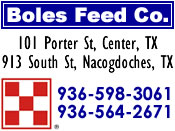 September 1, 2017 - The details are sketchy at this point, but more changes are coming down the pike with Toyota ShareLunker this season as Texas Parks and Wildlife's inland fisheries division works to refresh a popular conservation program that seems to have become stale with time. ShareLunker is a spawning and genetics research program run by the Texas Parks and Wildlife Department since 1986. The program solicits anglers who catch Texas bass weighing 13 pounds or more to loan the fish to the state agency for spawning and genetics research.
September 1, 2017 - The details are sketchy at this point, but more changes are coming down the pike with Toyota ShareLunker this season as Texas Parks and Wildlife's inland fisheries division works to refresh a popular conservation program that seems to have become stale with time. ShareLunker is a spawning and genetics research program run by the Texas Parks and Wildlife Department since 1986. The program solicits anglers who catch Texas bass weighing 13 pounds or more to loan the fish to the state agency for spawning and genetics research.
ShareLunkers are always females. The big fish are paired with hand-picked males for spawning in hatchery raceways. A portion of the offspring are retained for research and the rest are stocked into donor lakes.
The minimum weight for entry was set at 13 pounds based on the belief that jumbo bass have superior genetics and would offer the best shot for producing more giant bass though selective breeding. The concept makes good sense, but more than three decades down the road things haven't panned out as well as a lot of people had originally hoped.
Texas bass fishing hasn't seen a new state record since 1992 and only handful of Top 50 fish have been documented over the last decade. Even so, the program has been a great public relations tool for promoting Texas bass fishing and getting the word out about catch-and-release. It also has provided researchers gobs of opportunity to learn more about proper handling techniques for heavyweight bass. To date, the program has taken in 570 entries.
The program got a confidence boost last season when genetics testing showed that two of the five entries turned in were the offspring of former ShareLunkers. One of the fish was caught last February at Marine Creek Reservoir near Ft. Worth. The bass weighed 13.07 pounds. Genetics testing linked the 11-year-old fish to a 2006 stocking of ShareLunker prodigy.
The other ShareLunker - a 13.06 pounder reeled in from Lake Naconiche - was linked to a 2009 stocking of ShareLunker offspring. Both fish were in excess of six inches when they were stocked.
ShareLunker kicked off its 31st season last October under a set of revamped guidelines from previous seasons. The changes were implemented under new leadership following the program's worst participation year on record. Only two entries were turned in during the 2015-16 season. The all-time high was 36 entries in 1994-95.
Changes put in place last year included a three month spawning season beginning Jan. 1, accepting non-pure Florida bass entries for spawning and eliminating private lakes as recipients of ShareLunker offspring.
Another noteworthy change was to begin relying strictly on ShareLunker offspring from pure Florida bass entries to rebuild TPWD's Florida bass hatchery program within 6-7 years. There wasn't any headway made towards that goal last season because none of the fish pulled off successful spawns in hatchery raceways.
TPWD is holding its cards close the vest regarding additional program changes that are coming this season, mainly because all the details aren't ironed out just yet. But one change that has been confirmed is that the season's traditional Oct. 1 starting date will shift forward four months to coincide with the new spawning season of Jan. 1 - March 31 put in place last year.
The new spawning season was implemented because data showed nearly 90 percent of successful Sharelunker spawns occurred during that time frame, and 75 percent of Sharelunker entries were caught during the months of January, February and March.
TPWD inland fisheries director Craig Bonds says additional tweaks will be announced long before the season opener and he is hopeful the changes will be well received by the angling public. One thing that won't change, however, is the threshold for entering a bass in the spawning phase of the program. Only fish weighing 13 pounds and up will be accepted.
"TPWD is in the process of relaunching the Toyota ShareLunker program to expand participation and increase engagement with our bass anglers," Bonds said. "We are very excited about the changes and will be sharing more news about the new program this fall."
There was plenty of chatter circulating last year that ShareLunker's new direction may lead it in the direction of a 12-month gig that would mirror Florida's TrophyCatch program in a lot of ways. If that is what winds up coming down the pike, it could be a good thing.
Run by the Florida Fish and Wildlife Conservation Commission, TrophyCatch is an incentive-based conservation program designed for anglers who catch-and-release largemouth bass heavier than eight pounds, in Florida. The FWC describes the program as a "citizen science partnership" instrumental in ensuring that FWC biologists are able to make informed decisions for the management and improvement of Florida’s lakes and rivers.
Anglers can enter TrophyCatch electronically by providing quality photos of the fish, including one that shows it on a scale with the recorded weight in clear view.
Participants are eligible to win all sorts of cool prizes like gift cards, fishing rods, decals, tackle discounts, etc….. The value of the prizes varies with the club level in which a fish is entered. The bigger the fish, the bigger the club and the bigger the prize. Everyone who enters a fish is automatically entered in a drawing to win a fully-rigged Phoenix bass boat at the end of the season.
Not surprisingly, TrophyCatch has been very well received by its constituents. Through four seasons more than 5,325 catches have been approved, and it continues to grow.
It will be interesting to see if Texas bass anglers respond likewise to tweaks in Toyota ShareLunker, once regarded as one of the most innovative freshwater fisheries programs in America.
Matt Williams is a freelance writer based in Nacogdoches. He can be reached by e-mail, mattwillwrite4u@yahoo.com.









